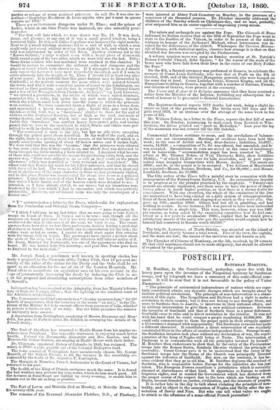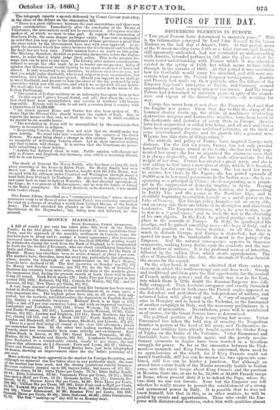POSTSCRIPT.
SATURDAY MORNING.,
M. Bonifaise, in the Constitutionnel, yesterday, opens fire with his heavy guns upon the invasion of the Neapolitan territory by Sardinian troops, and by telegraph we have a summary of this semi-official com- ment. It will be seen that it is not favourable to the policy of Victor Emmanuel- " The principle of autonomies' independence of nations which are regu- larly constituted admits any dynastic changes which are brought about by interior political revolutions. The principle of non-intervention is a etinse- oration of this right. The Neapolitans and Sicilians had a right to make a revolution in their country, but it does not belong to any foreign State, not more to Sardinia than to Austria, to intervene in their national affairs and by military intervention to give them a new political existence. Between the invasion of Garibaldi and that of Sardinia there is a great difference. Garibaldi came to raise and to direct revolution in the interior. It was not with his band that he could conquer a people numbering 10,000,000. He could only communicate to them the proper spirit in their struggle against a Government stamped with unpopulanty. The Sardinian invasion has quite a different character. It constitutes a direct intervention of one regularly constituted State in the affairs of another independent State. Strange to say, the Sardinian invasion took place without any declaration of war, the repre- sentative of the King of Naples still being at Turin. The intervention of Piedmont is in contradiction with all the principles invoked by herself." M. Boniface then endeavours to show that, by the entry of the Predmontese troops into the Roman States, Sardinia likewise violated the principle of neutrality. Count Cavour gave it to be understood that the entry of the Sardinian troops into the States of the Church was principally directed against the influence of Garibaldi. But now on the contrary, it has be- come evident that they go to aid him. M. Boniface deplores the conduct of Sardinia, who is responsible before Europe for the initiative she has just taken. The European Powers constitute a jurisdiction which is naturally alarmed at disturbances of that kind. It appertains to Europe to redress forgotten rights, and to remind the Government which has deviated from the proper course of the respect due to the laws which are binding on all States, because founded on justice, civilization, and the interests of peoples. It is rather late in the day to talk about violating the principle of neu- trality, and to object to the annexation of Naples and Sicily after the an- nexation of Savoy and Nice. But who can tell what value we ought to attach to the effusions of a semi-official French journalist?
The telegraph reports a speech delivered by Count Cavour yesterday, at the close of the debate on the annexation bill.
"There is a great difference between the past annexations and those now under consideration. Immediately after the conclusion of the Treaty of Villafranca, the annexations could not be precipitated. A Congress was also spoken of, at which we were to take part. As regards the annexation of Southern Italy, the same danger nes longer exists. Your vote is demanded in order that you may give to the inhabitants of those provinces a proof that the steps taken by the Government have met with your approval. As re- gards the disunion which has arisen between the Government and Garibaldi, the fault has not been ours. Public opinion leaves no doubt on this point. The Ministry, therefore, decided on presenting themselves before the Parlia- ment, in order that it might judge their policy. This is the greatest ho- mage that can be paid to any man. The Crown, after mature consideration, refused to accept the offer made by us to tender our resignation, being of opinion that Government would thereby be too much weakened at home and abroad. It only remained to us, therefore, to address ourselves to you, not that you might judge Garibaldi, who is not subject to your examination, but ourselves, over whom you have power. Should you support us we shall go to meet Garibaldi, and present to him the order of the day proposed by your committee which you will approve, and which we accept with all our hearts. We shall offer him our hand, and invite him to union in the name of the Italian Parliament.
"The cession of Italian territory as an indemnity has again been spoken of. To this report / give a formal denial, and add, that when the annexa- tion shall have been accomplished, any cession of territory will become impossible. Nobody will be able to ask such a cession from a country with a population of 24,000,000.
"An attack against Rome and Venice has also been spoken of. We desire that the Eternal City should become the capital of Italy. But, as regards the means to that end, we shall be able to say in what condition we should be six months hence.
"The revolution in Rome will be accomplished by the conviction that liberty is favourable to religion.
"Respecting Venetia, Europe does not wish that we should make war upon Austria. We must take into consideration the opinion of the Great Powers. We must bring about a change in this opinion. Europe believes us incapable of delivering Venetia alone. Let us show ourselves united, and that opinion will change. It is untrue that the Venetians are peace- fully submitting to their destiny. "Austria has flattered them in vain. Public opinion will change not only in France and England, but Germany also, which is becoming liberal, will be in our favour."



























 Previous page
Previous page